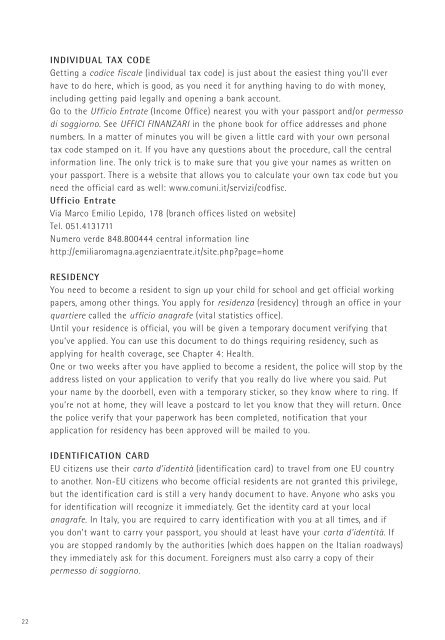BOLOGNA INSIDE Second Edition - IWF Bologna
BOLOGNA INSIDE Second Edition - IWF Bologna
BOLOGNA INSIDE Second Edition - IWF Bologna
Create successful ePaper yourself
Turn your PDF publications into a flip-book with our unique Google optimized e-Paper software.
22<br />
INDIVIDUAL TAX CODE<br />
Getting a codice fiscale (individual tax code) is just about the easiest thing you’ll ever<br />
have to do here, which is good, as you need it for anything having to do with money,<br />
including getting paid legally and opening a bank account.<br />
Go to the Ufficio Entrate (Income Office) nearest you with your passport and/or permesso<br />
di soggiorno. See UFFICI FINANZARI in the phone book for office addresses and phone<br />
numbers. In a matter of minutes you will be given a little card with your own personal<br />
tax code stamped on it. If you have any questions about the procedure, call the central<br />
information line. The only trick is to make sure that you give your names as written on<br />
your passport. There is a website that allows you to calculate your own tax code but you<br />
need the official card as well: www.comuni.it/servizi/codfisc.<br />
Ufficio Entrate<br />
Via Marco Emilio Lepido, 178 (branch offices listed on website)<br />
Tel. 051.4131711<br />
Numero verde 848.800444 central information line<br />
http://emiliaromagna.agenziaentrate.it/site.php?page=home<br />
RESIDENCY<br />
You need to become a resident to sign up your child for school and get official working<br />
papers, among other things. You apply for residenza (residency) through an office in your<br />
quartiere called the ufficio anagrafe (vital statistics office).<br />
Until your residence is official, you will be given a temporary document verifying that<br />
you’ve applied. You can use this document to do things requiring residency, such as<br />
applying for health coverage, see Chapter 4: Health.<br />
One or two weeks after you have applied to become a resident, the police will stop by the<br />
address listed on your application to verify that you really do live where you said. Put<br />
your name by the doorbell, even with a temporary sticker, so they know where to ring. If<br />
you’re not at home, they will leave a postcard to let you know that they will return. Once<br />
the police verify that your paperwork has been completed, notification that your<br />
application for residency has been approved will be mailed to you.<br />
IDENTIFICATION CARD<br />
EU citizens use their carta d’identità (identification card) to travel from one EU country<br />
to another. Non-EU citizens who become official residents are not granted this privilege,<br />
but the identification card is still a very handy document to have. Anyone who asks you<br />
for identification will recognize it immediately. Get the identity card at your local<br />
anagrafe. In Italy, you are required to carry identification with you at all times, and if<br />
you don’t want to carry your passport, you should at least have your carta d’identità. If<br />
you are stopped randomly by the authorities (which does happen on the Italian roadways)<br />
they immediately ask for this document. Foreigners must also carry a copy of their<br />
permesso di soggiorno.


